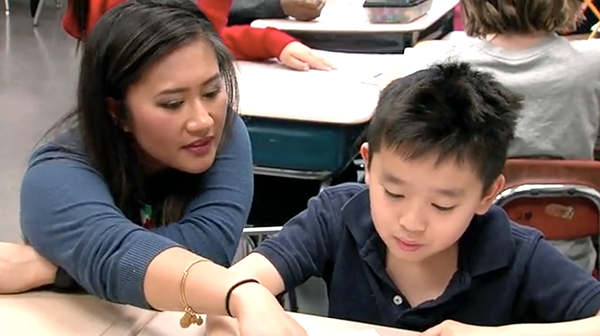Student Reflection: Why Ask Students What They Think about Math?
by Marta Garcia and Annie Sussman
October 4, 2023

— Godfrey , 2021.
“An equitable learning community requires first and foremost knowing who our students are and using that knowledge to situate math learning in the lived experiences of students, building on the knowledge and skills each student brings to school and acknowledging and welcoming students’ identities into the classroom.”
Many teachers use formative assessment, exit tickets, journal writing and/or other strategies to gather information about how students think about specific math content. Using these types of tools to collect information about how students are experiencing math class and how they view themselves as learners may feel less familiar. Gathering this type of data is an important part of creating and maintaining an equitable learning community.
Establishing an atmosphere of trust is essential if we want students to feel safe sharing openly about themselves and their experiences with us and with each other. We can create a community of trust by listening actively and generously to our students’ contributions, and by building caring relationships that are anchored in mutual respect.
When we set aside time for students to reflect and offer feedback, we show them that we value their opinions and care about them as individuals. Whole group discussions, interviews, and student reflection tools are powerful ways to examine students’ dispositions, their expectations, and their reactions to math class. When we take time to listen and respond to the feedback students offer, we demonstrate our commitment to fostering a supportive learning community as well as our respect for our students’ contributions. If used regularly, such reflections can help us see how students’ thoughts about mathematics, and about themselves as learners, are or are not changing over time. This choice to pay attention to and respond to students’ needs and current dispositions is a critical step in developing an equitable learning environment.
Ms. Diaz, a fifth-grade teacher, shares her experience: This past year I have been intentional about setting aside time for my students to reflect on how they see themselves as learners of math and as part of a class of math learners. It doesn’t take long to have them answer a question on an index card such as “Do you think your classmates value your ideas? Why or why not?” I learn so much about my students and how they see their status in the classroom. It helps me make adjustments that provide more equitable participation.
Students become invested in the learning community when they recognize that they can influence their own learning as well as the dynamics and culture of their classroom. When we invite our students to reflect on their participation and on how their ideas are valued and responded to, we highlight the role of the individual as well as that of the community. When we listen to and respond to their feedback, we are empowering them to take an active role in their own learning and in the classroom community.
A student in Ms. Diaz’s class, who had been reluctant to share in whole group discussions during the first four weeks of school, wrote this reflection in response to the question: What has math class been like for you in school so far? This year in math class you give us time to write in our math journals about how we are feeling about math class. We also get to share ideas about how we could make math class better during discussions. I can tell you care about not just what I learn but how I learn. I like to be able to tell you how I feel. After reading this student’s response, Ms. Diaz was able to understand that this student does value the sharing of ideas. She would like to further understand why this student is not yet sharing his ideas in the whole group. Her next step might be to explore whether this student considers his own ideas valuable and believes that his classmates see value in his ideas.
As our students learn to examine their own learning needs and how those needs are met in the classroom, their autonomy and self-efficacy is affected. As they reflect on how they impact and are impacted by others in their class, they are considering issues of status and equitable interactions. And, as they recognize that their teachers are listening to and responding to their reflections, they become aware of how authority is shared. This is a critical component of Aguirre et. al.’s equity-based practices, which stress the importance of distributing mathematics authority and presenting it as interconnected among students, teacher, and text (Aguirre et. al., 2013). Why ask students what they think about math? Establishing student reflection as a critical part of the learning process impacts both our students and the ways in which we as teachers learn from and respond to them.
Note: This blog is the first of several that discuss student reflection. Read the second, third, and fourth in the series, which include a focus on what questions to ask, when, and in what ways.
References
Aguirre, J., Mayfield-Ingram, K., & Martin, D. B. (2013). The impact of identity in K-8 mathematics. National Council of Teachers of Mathematics.
Godfrey, Lynne. (2023, October 2). Establishing an Equitable Learning Community in the Elementary Mathematics Classroom. Math Equity Forum Blog.

Search for related blog posts
